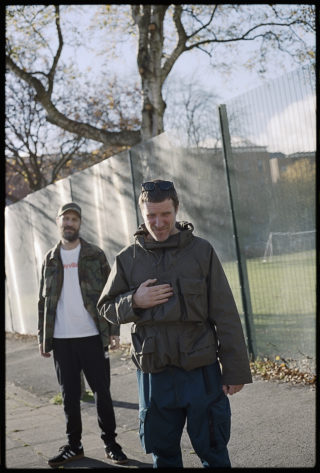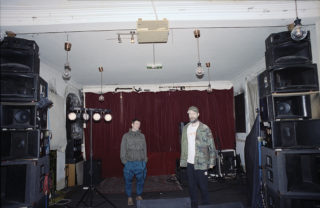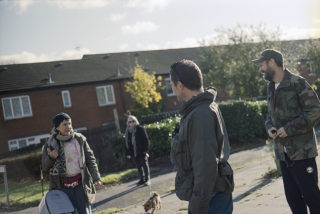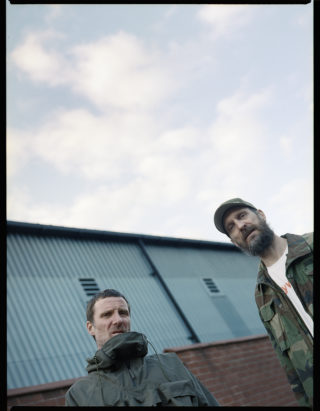Sleaford Mods: Things can’t only get better
The unlikely rise and continuing brilliance of Britain's first truly post-2008 band

The unlikely rise and continuing brilliance of Britain's first truly post-2008 band
Sleaford Mods are on the cover of Loud And Quiet Issue 144. Grab your copy, or become a member to support independent music and journalism, here.
One weeknight in 2010, Andrew Fearn was DJing in the main bar at Nottingham’s Chameleon – an independent venue minded to book acts deemed uncommercial or just unhelpful by the city’s live music establishment. One such act was Jason Williamson, who had been performing his act – a kind of sour, sweary spoken word over repetitive breakbeats – to about a dozen people upstairs. Nipping out for a post-match cig, Williamson overheard a piece of music Fearn was playing. It was a remix of George Michael’s ‘Careless Whisper’, though Williamson wouldn’t have known that – Fearn, absorbed for most of his adult life on the skint fringes of electronic music, had recently got into taking instrumental B-sides of giant pop hits and rendering them unfathomable through looping, echo and effects. Williamson, impressed, walked over to the DJ booth and introduced himself.
A weekday in 2020, and Andrew Fearn and Jason Williamson are back at the Chameleon, showing me around the venue that would be the ground zero of their shared ambition over the last decade. The venue’s previous owner, the pair both laugh, used to decorate the space with his own paintings of the vulvas of his seemingly endless parade of glamorous companions. Williamson declines a free pint; it’s the day before the November lockdown, and if the beer doesn’t go today then it’s down the drain. Accordingly, there’s a slightly frantic Christmas Eve quality to the city today, tempered only by ominous news reports glimpsed in shop window televisions and push notifications concerning the US presidential election, which had taken place the previous day. Williamson walks over to the red tattered rug on the Chameleon’s small stage and points out that it’s the exact same one from a decade previously. He stares at the stage a little, and then takes a picture on his phone. What went on here? What kind of coup must have been staged to transport Sleaford Mods from the outsider fringes to one of the most successful alternative groups in Britain?
We’re meeting as the pair are preparing the release of their new album in early 2021, Spare Ribs. To call it the sixth Sleaford Mods album is to do something of a disservice to their prodigious output – across eight years, that’s six albums and four EPs, nearly a hundred songs in total, not counting the five albums Williamson released one his own before meeting Fearn. Recorded in July, once recording became possible once again, Spare Ribs pushes their wilfully stark sonic blueprint into perhaps its sharpest, most pop form yet – even threatening anthemia on tracks like ‘Nudge It’. In a break from its predecessors, they’ve brought in collaborators from the Sleaford Mods extended universe – rising Nottingham songwriter Billy Nomates, and Amy Taylor of Australian punks Amyl and the Sniffers. One track (accurately, it turns out) portends a sticky end for one Dominic Cummings. Another, over a terrific Weatherall drug chug, sees Williamson consider Elon Musk (“with a face that looks like beef”), the guy from Idles (more of which later) and the spice epidemic. It’s also inevitably shaped by lockdown. As the world turned across March, the pair were touring in Australia – a string of US dates were cancelled, they both remember a lot of being bewildered in airport departure lounges.
“We were kind of, this is bullshit,” remembers Williamson. “I just thought it was some government thing initially. I got completely conspiracy theorist early on! I stepped right outside of that once I realised.” Like many people, on returning home for lockdown Williamson experienced something he terms “a period of a lot of self-doubt with who I was.”
“My survival mechanism kicked in,” he reflects. “I just had to tell myself that this is it. Bye career. You’re looking after yourself and your family.” Some tracks for the record had already been written, and Williamson just kept writing.
“It was quite depressing queuing outside shops when that first kicked in. Though it was obviously the right thing to do it felt depressing. You noticed people’s behaviour in the queues, and their expressions – everyone looked really worried or disorientated. You’d hear people talking about it being immigrant’s faults, I could hear them saying that.” Two tracks on the album, ‘Out There’ and ‘Top Room’, are explicitly focused on lockdown, but something else happened during that time too. Exercising in the garden, Williamson suffered a back injury related to an operation he’d had as a child. “I’ve got a form of spina bifida which some top back surgeon sorted out for me when I was a kid,” he explains. “If not, it would have been a case of me being paralysed for life.” When he sustained his injury this summer, doctors initially struggled to understand quite what had happened, and how he could recover.
“It was all quite heavy, it got quite emotional actually. So that filtered into the lyrics really. I just kept thinking about stuff.” Both ‘Fishcakes’ and the excellent single ‘Mork n Mindy’ came from this period of introspection – for the first time, Williamson writes about his childhood here.
“My mum had to take us to the chip shop when it was my birthday, because she just didn’t have any money. We were just sat in the chip shop, which I thought was great. And there was a couple of Christmasses where presents were second hand. You don’t mind, but you look back, now I’ve got kids, the guilt of my parents… I wanted to… I wanted to try and put the experience of being a kid in Grantham in 1978 into a song. It’s not woe is me, but I wanted to give a picture of it.”

A middle-aged woman holding a sign for a missing cat that she’s out searching for spots Sleaford Mods and walks over to them. “What are you doing back here?” It’s a fair question – Fearn and Williamson are posing against the primary school railings where, earlier in the last decade, they stood for the sleeve of Austerity Dogs. It’s a little like turning up at Abbey Road to find Paul McCartney sauntering across the zebra crossing. The school is on the corner of Tennyson Street – a slightly studenty, slightly gentrifying street of three-storey town houses carved up into individual flats, such as the top floor flat that Andrew Fearn previously rented. It’s a quiet street; electronic pop wafts out of a window, there’s little movement outside. It was here, on Fearn’s home setup, that the pair did most of the recording for Austerity Dogs, Divide and Exit and Key Markets. Williamson’s visibly animated as he remembers the adrenaline rush of recording vocal takes and running down to the off-license over the road to buy cans of Heineken. A local musician lived underneath. Perhaps it was envy, perhaps it was simply the noise, but during one late-night session, he stormed upstairs into Fearn’s flat – all spliff smoke and empty cans – unplugged the power and walked straight back downstairs without a word. “You wouldn’t mind going to work on a few hours’ sleep,” remembers Jason, who was then working at Broxtowe Borough Council as a benefits advisor at the time when Sleaford Mods’ unexpected crossover into the mainstream occurred.
From that point onwards, there’s been an easy tendency to categorise Sleaford Mods as a sort of necessary voice of protest against whatever injury Britain might be inflicting upon itself this time (austerity, Brexit, Boris Johnson, the pandemic response, take your pick – another will be on the way soon). It’s understandable, but it’s also a category error – Sleaford Mods are something far bleaker, far more nihilistic than that. We’ve listened to Jason Williamson’s worldview for a decade now, and the results are in. “Things aren’t getting any better” is how he terms his outlook today, “we’re not learning.” Instead, Sleaford Mods is about the pain in how it feels to be living underneath it all at this particular moment in time. What does that do to a person? It’s not an accident that their crossover moment occurred at exactly the same point at which the politically staid early 2010s catalysed into an era of fiery populism of left and right. Sleaford Mods did something similar – they were an aesthetic protest vote and, in many ways, Britain’s first properly post-2008 band. The album’s title track, ‘Spare Ribs’, touches on this. It’s an idea that Williamson has been chewing for some time – just as the human body can survive without a couple of ribs, he puts to me, capitalism is able to survive whilst writing off a good chunk of the population, deeming them expendable.
“We’re kind of dispensable aren’t we, in the name of profit, and that goes all sorts of ways. The way Johnson’s treated the pandemic, people have died willy nilly by him making silly decisions. Or people using terrorism for their own gains, which involves killing people. Our lives are constantly being forsaken for somebody else’s profit.” He returned to the idea a lot over lockdown – there’s a church at the end of his road, where the area’s sizeable homeless population gather to get food from a charity. Williamson and his wife are on good terms with many of them. “I’d buy fags for them,” says Williamson, “but it just got too bleak. You can’t do anything can you? You can’t take them home. They’d have a spice drop off on a Wednesday or Thursday, geezer comes up to the church with a big bag of it and dishes it out. And then they’re gone, it’s like something out of a George Romero film.”
We walk through West End Arcade, where – happily – two music shops still advertise CDs, DVDs and cassettes, whilst new age hemp shops keep eccentric hours and shoppers can buy definitely, genuinely authentic signed photographs of Kylie Minogue, Elton John and Burt Reynolds. Some of Sleaford Mods’ fans could even appear on this roll call; one of the stranger lockdown sights being Robbie Williams live-streaming from his LA home performing a spirited karaoke version of their 2019 single ‘Kebab Spider’. Passing a vintage clothes shop, Williamson points out that this was likely the site of the first Sleaford Mods gig proper – Fearn initially hesitant to appear on stage with him until, he half-jokes, people actually started turning up. That Fearn stands on stage pressing play on a laptop has always been a huge red herring to his talent – working ideas from dub, post-punk, rave and left-field electronica into a framework that remains minimalist, un-busy and like no one else. His dead-eyed loops – slightly paranoid, slightly aggro – sound like life as lived in modern Britain. Is he ever bothered by the way his contribution can be slightly minimised? “In the early days yeah, it would get dismissed a lot,” Fearn agrees, “just seen as this punk poetry thing. It’s difficult.”
“It’s hard because from my point of view, Andrew’s so studied and the lanes he goes down are constructed in such an intelligent manner that a lot of people tend to overlook it out of laziness,” says Jason. “That and perhaps a bit of ignorance. You don’t have to know the tools he uses or the music he listens to to be mindful of the fact that there’s a lot of work that goes into it.”
The last year or so has involved no small amount of upheaval for the pair. In 2017, they signed to Rough Trade to release the album English Tapas. Their long-term manager, Steve Underwood, then convinced them to self-release 2018’s Eton Alive, resulting in them acrimoniously parting ways before the album even made it out. Sleaford Mods are now managed by Williamson’s wife Claire and have returned to Rough Trade.

An increasingly commercial prospect, larger labels were very interested that they were looking for a deal too. Williamson laughs remembering being flown to Berlin to meet an executive from a big label. “The way I see it,” the executive opened the meeting, “it’s you and Idles holding a mirror up to society.” He laughs. “I thought, I’ll buy you a coffee and you can fuck off.”
Over the past year, Sleaford Mods – alongside Fat White Family – have been public and trenchant in their criticisms of Bristol punks Idles, with Williamson terming the group, “cliched, patronising, insulting and mediocre.” Whilst this might look like indie handbags time, for Williamson it touches on important fault lines around not just class but the purpose of what they’re trying to do. Idles were vocal fans of Sleaford Mods, and you can hear some of Sleaford Mods’ ideas in Idles’ work, straightened out into a more traditional guitar lineup, with material that’s less descriptive and more prescriptive – more earnest, aiming to be relatable and for arms-in-the-air sentiment. Some of this is the inevitable problem of any artist being unable to control their influence – or, as Williamson puts it today, “seeing the ricochet of what we’ve done, but not done properly.” But it’s Idles alleged class appropriation that appears to vex him the most. The excellent ‘Nudge It’ on the new album – described accurately by Williamson as Wire meets Wu Tang – is a sustained diss at an unnamed media figure “stood outside a high rise trying to act like a gangster.” I ask about it.
“I don’t want to mention names,” Williamson assures me, “but that song is going on about the appropriation of class images. And after being criticised more, they’ve learnt nothing about it.”
“If you don’t live on an estate, you can’t go posing in front of one,” says Andrew. “It’s not for you and it doesn’t represent you. And the opposite too, if you are from that part of London, if that is where you’re from, do it.”
“You can imagine the people living in them, and this tattooed dude coming along with a camera crew. Why bother? It’s depressing – you surely can’t be that thick?” There’s a pause. “We’re talking about Joe Talbot here, from Idles. His justification was that he likes brutalism – well that’s fucking convenient. If that’s the case, go to a different brutalist building. He knows what he’s fucking doing, he just isn’t aware of it and it’s enraging.”
Speaking to The Independent a few months ago, Talbot labelled Williamson “a fucking bully”, arguing that he’d “never once claimed to be working class.” Williamson sits back.
“I couldn’t understand why he said it, but he’s not aware of himself, so he takes it as if someone’s bullying him. I don’t know. He likes to play the victim a lot that lad, doesn’t he? He’s a big old victim. I’m not having it really. This song’s called ‘Anxiety’, oh really, that’s convenient. Fuck off.”
Williamson confirms that ‘Nudge It’ is “dedicated to that cunt”, and also points to the track ‘Elocution’. “Him, and other people who would stick up for him who are just as creatively empty, they all stick together. ‘Elocution’ is partly dedicated to that, but also to this ongoing indifference with having to toe the line in the industry to keep going – networking, agreeing to do something you wouldn’t necessarily do but that if you did it you might get OK exposure. A couple of these people left a nasty taste in my mouth – they wouldn’t piss on you if you were on fire, let alone worry about the state of independent venues.”
Andrew sits forward, smiling. “It’s not really my argument, so I tried to listen to it, and it’s just nothing. There’s nothing to like or to hate, it’s so bland. There’s just so much better music – it can exist but it shouldn’t be that big,” reflects Andrew. “There’s better things happening which aren’t getting the exposure. Look at JPEGMAFIA – it’s so weird and different, but it’s difficult for him to be part of any scene. It’s all a bit purist now – you used to get a mixture of like reggae and rock or whatever, where’s that? Stuff that mixes elements together and creates new music. Everything’s quite racist and separating now.”
At the root of this seriousness of cause is probably the fact that Williamson had wanted success for most of his life. Now fifty, he’d spent his twenties and thirties in and out of fairly trad guitar bands with names like Meat Pie, being sacked from more jobs than you’ve probably ever had. Sleaford Mods is the kind of music you make when you’ve really given up on that success. All that resentment and invective doesn’t come from nowhere, and he takes it seriously. There’s a revealing moment in Christine Frantz’s 2017 documentary on the band, Bunch of Kunst, where Williamson’s wife Claire tries to describe the younger man she remembered from around Nottingham: “I always thought he was going to be one of those people who’d just disappear off the radar,” she explained, “and you’d hear they’re just dead.”

For just short of five years now, Jason Williamson has been free of the alcohol and drug use that had been a near constant feature of his life since his early twenties. Success had meant more money to withdraw from the cashpoint, and more opportunities at which to do so, and after a running jump at sobriety, the summer of 2016 had been marked by what Wiliamson terms “a series of really dark drug binges.” Uppers were the problem in general; specifically, cocaine.
“It was clear that I was going to lose my family if I didn’t stop,” he explains flatly. “I’d come to the final post of my drugs career.” He remembers being alone in his house, his family having moved out into a hotel, and emptying a bottle of Staropramen into a glass before pouring the rest down the drain, and at this point stopped drinking.
“Early sobriety was a bit like going through a mid-life crisis – my personal image was all over the place. I was a little bit lost but at the same time it was a massive relief. Morning times started to be particularly powerful emotional experiences simply because mornings were always a reminder of the state that I was in from the night before. Automatically I felt like I was gaining some resistance, gaining some new-found strength.” Williamson credits a support network of his wife and the psychotherapist he was visiting, but also the simple financial stability that had arrived for the first time in his life. “When you’re sober and on that winning streak it’s the race towards yourself that you’re concentrating on. You become quite selfish again, like you were when you were dependent on substances, but it’s a different kind of selfishness; one where you want to become realised, so to speak.”
“I think it’s interesting how it hasn’t really affected things,” says Andrew, “because it didn’t really affect him producing stuff and being so prolific – that’s been the reward.” Creatively too, Williamson began writing with renewed insight on his own consumption, but also that of his generation, hurtling through middle age and unable to make sense of their continued consumption.
Whilst to the outsider there might appear something traditionally masculine, macho even, about Sleaford Mods (two blokes, the aggression, the nods to oi and the beerier end of punk) Jason Williamson can be claimed as an unlikely icon for a more complicated masculinity. Sleaford Mods are one of the most thrilling live acts on the planet, and as much as you can credit this to the straightforward rage of it all, it’s also the sheer, well, strangeness of Williamson’s performance. He pouts, gurns, waddles, slaps his head, adopts the hand gestures of a diva, dad dances – observe for long enough and you realise the whole thing is rather camp. Over lockdown on Instagram, Williamson stands topless underneath an apron brandishing carrot cake or cinnamon buns and a leer that would make Nigella blush. “I like it, I like being camp,” he says, elbowing away an initial defensiveness. “I like dance.” He settles in his chair a little, warming to his theme. “Unchoreographed, totally amateur dance. Stuff that doesn’t necessarily look slick but it works. If you’re halfway through a tour and you’ve got your dance sorted out, it’s quite liberating. I like bringing that to it. Camping it up and shaking your hips.”
“It’s very inverted though isn’t it,” says Fearn. “There’s this weird myth – the idea that we’re both really aggro, and it attracts those kinds of men, when really it’s not like that at all.”
“I like lad culture,” says Williamson, “not the misogynistic side of it but the creative things. The uniform, the music, the way that men hold themselves in all male groups. But it just got rinsed at the end of the ’90s – there was nowhere else for it to go. The misogynistic element I completely reject, but there’s still a lot to be said for the various UK subcultures, they really appeal to me.”
As the day ends, we make our way to JT Soar. A former fruit and veg warehouse, it’s now a (small) live music space as well as a recording studio upstairs, and it was here that the sessions for Spare Ribs took place. Still clearly enamoured by their process, ask them about any song and the first thing they’ll invariably tell you is just how quick the track took to write or record – a morning here, an afternoon there.
We haven’t really mentioned the US election, all quite glad to have a distraction, but I point out to Williamson that so far events have had a habit of vindicating his bleaker instincts. “Will civilisation find a way out though?” he offers at one point, to nobody in particular. “I think so. Humankind might survive and move onto another level of its potential.” A pause. “But at the minute? No way, it’s getting worse. I’ve been at the bottom, I’ve had really rough times and I’m hardened to it, so I don’t mind saying it. I don’t think it’s going to get better.”